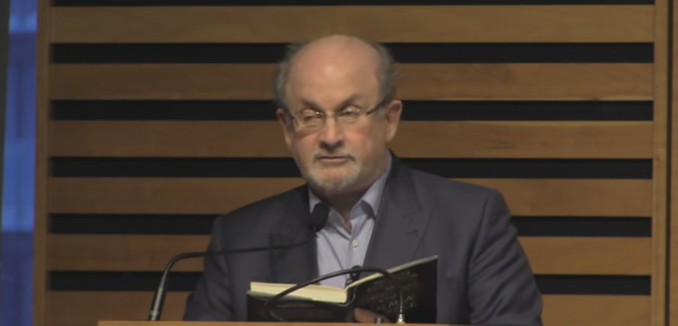40 Iranian state-run media outlets announced in a coordinated push on Sunday that they were renewing the death sentence fatwa on British author Salman Rushdie, raising the bounty for killing him by $600,000.
Ayatollah Ruhollah Khomeini, the first Supreme Leader of Iran, placed a fatwa and a $3 million bounty on Rushdie after his 1989 book The Satanic Verses was deemed blasphemous. Rushdie’s Japanese translator was murdered in 1991 and translators in Italy, Norway, and Turkey were targeted for assassination. The current Supreme Leader, Ayatollah Ali Khamenei said that in 2005 that the fatwa was still in effect.
Although often described as a moderate or reformist, Iranian President Hassan Rouhani supported the fatwa against Rushdie. While on a trip to Germany in 1993, Rouhani said (.pdf) that “the West should tolerate the edict [fatwa] as an act of freedom of expression, just as it shelters Rushdie for the sake of the so-called freedom of expression.”
Fars News Agency, which is affiliated with Iran’s powerful Islamic Revolutionary Guard Corps (IRGC), was one of the largest contributor to the bounty—nearly $30,000. Billions of dollars of Iranian government funds were unfrozen as part of the sanctions relief built into last year’s nuclear deal.
The Wall Street Journal reported in January that the Iranian government’s repression had increased after the deal was signed. Two Iranian poets were sentenced in October to lashes and jail time for shaking hands with members of the opposite sex. The following month, Iranian journalists were arrested by the IRGC. The government has also arrested American citizens and a permanent resident. The growing oppression prompted Anti-Defamation League national director Jonathan Greenblatt to write in December that Iran’s “ongoing human rights violations and its external aggressions must be taken into account when considering the prospect of normalized relations.”
The ongoing crackdown on political dissidents and reformists, including the disqualification of 99% of so-called reformist candidates in the upcoming elections, was long predicted by critics of the nuclear agreement.
[Photo: torontopubliclibrary / YouTube ]




